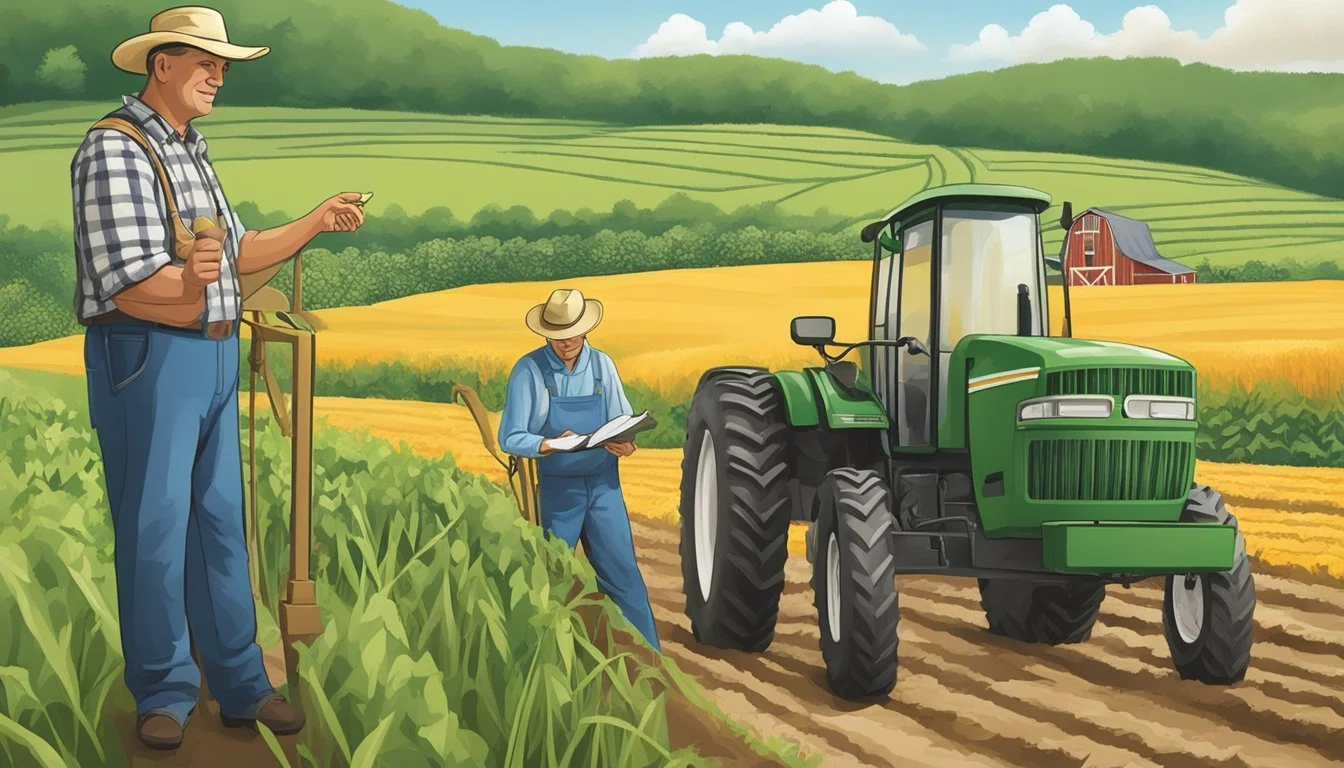Farm Loans in Tennessee
Navigating Financial Options for Farmers
This Article is Part of Our Guide on Farm Loans for All 50 U.S. States
Farm loans in Tennessee provide a vital financial foundation for the state's agricultural sector. As an integral part of the farming community, these loans enable producers to manage operations, purchase land, and invest in necessary improvements to stay competitive. With Tennessee's climate offering ideal conditions for a variety of crops and livestock, access to credit through farm loans is a key factor for farmers looking to capitalize on the state's agricultural opportunities.
The United States Department of Agriculture (USDA) Farm Service Agency (FSA) plays a significant role in supporting Tennessee farmers. The FSA offers farm ownership loans, operating loans, and microloans to eligible borrowers, with specific programs also available to assist underserved and beginning producers. Moreover, the Inflation Reduction Act has allowed USDA to deliver substantial assistance to financially distressed borrowers, amplifying the stability and resilience of the state’s farming enterprises.
Financial institutions like Farm Plus Financial and Farm Credit offer government-secured loans to Tennessee farmers, providing them with reliable credit options. These organizations cater to the financial needs of the farming community with a variety of loan products and terms that can be tailored to each producer's unique situation, reflecting a deep understanding of the challenges and demands faced by those working within this vital sector of Tennessee's economy.
Understanding Farm Loans
Farm loans are financial tools available to assist American farmers and ranchers with the necessary capital for their agricultural operations. These loans can facilitate everything from starting up a new farm to expanding an existing one, ensuring sustainable growth and production.
Types of Farm Loans
The U.S. Department of Agriculture (USDA) through the Farm Service Agency (FSA) offers several types of farm loans.
Direct Farm Loans are provided directly by the FSA to the farmers and ranchers.
Guaranteed Farm Loans allow private lenders to extend credit to farmers with the USDA guaranteeing a portion of the loan.
Farm Operating Loans (FOL) aid farmers in their daily operations and marketing expenses.
Farm Ownership Loans (FO) help farmers acquire farmland, construct and repair buildings, and promote soil and water conservation.
Microloans are designed specifically for small, beginning, niche, and non-traditional farm operations, offering smaller amounts of financing.
Eligibility Criteria
Eligibility for these farm loans is generally based on several specific criteria:
Farm operation must be managed by the borrower and exhibit sufficient profit potential.
Credit History - The borrower should demonstrate acceptable credit history.
Experience - Beginning farmers must have adequate farming or ranching experience.
Citizenship - Applicants must be a U.S citizen or permanent resident.
Other criteria include the inability to obtain credit elsewhere, the owning and operating requirement, and compliance with federal crop insurance programs.
Loan Application Process
Farmers and ranchers seeking a loan must follow a defined application process:
Assessment
Determine your eligibility and select the appropriate loan program.
Application Submission
Gather required documentation, including business plans, financial statements, and collateral.
Visit the local USDA Service Center to submit the application.
Review
The USDA evaluates the application based on the presented documentation and overall creditworthiness.
Approval and Disbursement
Upon approval, the loan funds are disbursed with clear instructions on repayment terms and other loan conditions.
Financial Resources for Farmers and Ranchers
Farmers and ranchers in Tennessee have access to a variety of financial resources designed to support agricultural operations. These resources range from federal programs to state assistance and commercial lending options.
USDA Farm Loan Programs
The United States Department of Agriculture (USDA) offers numerous farm loan programs through its Farm Service Agency (FSA) to aid farmers and ranchers. On Farmers.gov, the USDA details options such as:
Operating Loans for costs like living expenses, livestock and equipment.
Ownership Loans to help purchase or expand farms.
Emergency Loans for recovery from natural disasters.
Tennessee farmers can visit their local service center for personalized assistance with these options.
Tennessee Department of Agriculture Services
The Tennessee Department of Agriculture provides state-specific financial assistance programs for eligible agricultural stakeholders. Their offerings include:
Grants and cost-share programs.
Funding for market development and agricultural innovation.
Role of the Tennessee Farm Service Agency
The Tennessee FSA plays a pivotal role by:
Administering federal programs at a local level.
Offering disaster assistance and conservation programs.
Providing credit and loans to beginning farmers and ranchers.
They ensure the integration of federal agricultural support within Tennessee.
Commercial Lenders and Banks
Commercial lenders and banks fill an essential role for Tennessee farmers seeking:
Access to Capital with competitive Tennessee farm loans.
Relationships with financial professionals who understand local agricultural needs.
Farmers can benefit from various loan products tailored to their farming operations and financial situations.
Specifics of Farm Operating Loans
Farm Operating Loans offered by the USDA's Farm Service Agency (FSA) are designed to meet the various operational needs of farmers and ranchers, providing essential capital to sustain and grow agricultural operations in Tennessee.
Operating Loan Uses
These loans can be utilized for a myriad of expenditures critical to the farm's day-to-day operations. Borrowers may use the funds for:
Purchasing livestock and feed
Acquiring farm equipment
Covering family living expenses
Buying items such as seed, fertilizer, and chemicals
Paying for fuel, repairs, or insurance premiums
Covering other necessary working capital expenses to keep their farm business active throughout the year
Interest Rates and Terms
Operating loans come with interest rates that are determined quarterly and are based on the government cost of funds. These rates are designed to be affordable to help farmers maintain their credit standing. The terms can vary depending on factors like loan purpose, the repayment ability of the borrower, and collateral. Loans for operating purposes are generally repaid within seven years.
Lines of Credit
Farmers may also opt for a line of credit option under the Operating Loan program, providing a flexible way to manage their farm’s cash flow needs. The line of credit allows them to draw funds, up to the limit, as needed to efficiently handle their farm business operations. Borrowers may purchase supplies or cover expenses without having to apply for a loan each time, thereby saving time and paperwork.
Operating loans and lines of credit are crucial tools that empower Tennessee’s farmers to maintain and improve their operations, ensuring the state remains a vital player in agriculture.
Farm Ownership Loans
Farm Ownership Loans are designed to support the acquisition and development of agricultural land. They serve as a critical resource for farmers and ranchers aiming to purchase or expand their operations.
Purchasing Land and Real Estate
To purchase or expand a farm or ranch, farm ownership loans may be utilized. The U.S. Department of Agriculture (USDA) Farm Service Agency (FSA) provides these loans with a maximum amount up to $600,000 for eligible borrowers. This financing can cover various needs, including payment of closing costs, construction, and improvement of farm buildings. The loans also emphasize the conservation and protection of soil and water resources, underpinning responsible agricultural practices.
Loan Rates and Repayment Plans
The interest rates for farm ownership loans can vary based on the program and the applicant's qualifications. Typically, these rates are competitive with those offered in the general lending market, with the aim to provide affordable financing to the agricultural community. Repayment plans for these loans are structured according to the farm's cash flow, ensuring that payments are feasible and sustainable over the term of the loan. A borrower may use the acquired real estate as collateral to secure the loan, providing a guarantee to the lending institution.
Support for New and Historically Underrepresented Farmers
Tennessee offers various programs aimed at bolstering the success of new and historically underserved farmers, ensuring that women, minorities, and the youth have robust opportunities in the agricultural sector. These programs are designed to provide financial assistance, mentorship, and improved access to resources.
Microloans for Small-Scale Farming
The USDA's microloan program assists beginning and underserved farmers in Tennessee with loans of up to $50,000 to help cover farm startup costs, essential tools, livestock, and crop expenses. This initiative is particularly beneficial for small-scale farmers looking to establish or expand their operations. They have simplified the application process, making it more accessible to those just starting out or with limited resources.
Youth Loans and Educational Opportunities
Tennessee extends its support to younger individuals showing interest in agriculture through the Youth Loans program. Eligible applicants between the ages of 10 and 20 can receive loans up to $5,000 to finance projects approved by 4-H clubs, FFA, or similar agricultural groups. Additionally, educational opportunities and hands-on experience are provided to equip the youth with necessary farming skills for future success.
Initiatives for Women and Minority Farmers
Women and minority farmers in Tennessee are further supported by targeted initiatives. The Direct Farm Ownership Down Payment loan, for instance, directly benefits these groups by aiding in the purchase of family farms. Participants are required to make a minimum down payment of 5 percent, facilitating easier entry into farm ownership. Furthermore, various outreach programs and partnerships work to improve their representation and success in the agricultural community.
Managing Risks and Uncertainties
To safeguard their livelihoods, farmers in Tennessee must skillfully navigate various risks, including natural disasters, market volatility, and fluctuating economic conditions. Effective management of these uncertainties is critical for maintaining a stable farm operation.
Disaster Assistance Programs
In the wake of natural disasters, Tennessee farmers have access to federal disaster assistance programs that provide crucial support. These programs aid in the recovery from adverse weather events, which can have devastating effects on farm operations, particularly for commodity crops and cattle. The Tennessee Department of Agriculture's Forestry, Agriculture, and Rural Markets (FARM) program also offers cost-sharing opportunities to help mitigate the impacts and ensure a resilient agribusiness economy.
Insurance and Conservation Programs
Farmers can mitigate operational risks through a variety of insurance and conservation programs. Crop insurance programs are key to protecting farmers against the loss of their crops due to natural disasters or significant price declines. Conservation programs, meanwhile, encourage sustainable practices that improve soil health, conserve water, and reduce erosion, leading to long-term stability and resilience of farm operations. Striking a balance between immediate recovery needs and long-term sustainability is essential.
Impact of Inflation and Economic Policies
Economic policies and inflation have direct consequences on farm operations. The Inflation Reduction Act is a pivotal policy that can affect input costs, commodity prices, and ultimately, farm profitability. Tennessee farmers must stay informed of changing economic policies and market conditions to make sound financial decisions, such as opting for specific types of loan structures like USDA's direct and guaranteed loans or portfolio loans that cater to agricultural businesses. Managing these financial aspects is vital in protecting their operations from the unpredictable nature of inflation and economic shifts.
Agricultural Trends and Commodities in Tennessee
Tennessee's agricultural sector is a vital component of the state's economy, showcasing resilience and adaptability. The focus here is on prevalent market trends for crops such as cotton, soybeans, (how long do soybeans last?) and corn, and on the livestock and ranch operations that are equally integral to the agricultural landscape.
Market Trends for Crops like Cotton, Soybeans, and Corn
The crop production in Tennessee has historically been diverse, with cotton, soybeans, and corn playing significant roles. Each of these commodities has its trends influenced by various factors including technological advancements, market demands, and climatic conditions.
Cotton: The state continues to be a notable producer of cotton. Fluctuations in the average cash price at Tennessee Elevators and Barge Points reflect the volatility in the market, which is influenced by global demand and trade policies.
Soybeans: As a key crop for rotation, soybean farming benefits soil health and provides a stable commodity for farmers, with trends in soybean prices and yields being crucial indicators of economic health in the agricultural sector.
Corn: Corn is another staple crop in Tennessee, where its gross revenue and production statistics are carefully watched by farmers and investors alike to gauge the economic tempo of agriculture in the state.
Livestock and Ranch Operations
The livestock sector in Tennessee encompasses a range of activities including cattle ranching, which is instrumental in the state's agricultural output. The careful analysis of cattle, sheep, goats, and milk production numbers reflects the health and trends of this segment.
Cattle: Cattle ranches form an essential part of Tennessee's agricultural identity, contributing significantly to the state's economy. The sector's performance can be measured in terms of headcounts, market prices, and the overall impact on agribusiness.
Livestock and ranch operations are sensitive to changes in feed costs, which include commodities like corn and soybeans, underscoring the interconnected nature of agriculture in Tennessee. This symbiotic relationship between crop farming and livestock rearing is a foundation of the state’s agricultural sector.
Additional Resources and Assistance
Farmers in Tennessee have access to a variety of support services and financial programs aimed at fostering growth and sustainability in agriculture. These resources are designed to provide technical assistance, education, and monetary aid through various channels.
Extension Services and Farming Workshops
Tennessee farmers can take advantage of extension services that offer educational resources, including farming workshops. These programs are typically run by universities or the state's Department of Agriculture, designed to provide farmers with the latest in agricultural research, best practices, and innovative farming techniques.
Grants and Funding Opportunities
Grants and funding opportunities for agricultural and forestry projects are readily available through the Tennessee Department of Agriculture. Programs like the Tennessee Forestry, Agriculture, and Rural Markets (FARM) cost share program provide financial support to various agricultural entities. The FARM program and similar initiatives aim to:
Strengthen supply chains
Expand agricultural production
Assist in recovery from economic disruptions due to unforeseen events, such as pandemics
Additionally, the USDA Farm Service Agency offers direct and guaranteed loans, aiming to help farmers maintain and expand their operations. Financial assistance has been provided to many financially distressed borrowers, illustrating a strong support network for the agricultural community in Tennessee.









